 Thank you for the opportunity to help the committee better understand the attitudes of people in the Muslim world toward the West, the United States in particular, and issues related to the war on terrorism.
Thank you for the opportunity to help the committee better understand the attitudes of people in the Muslim world toward the West, the United States in particular, and issues related to the war on terrorism.
Since its first public opinion survey in 2002, the Pew Global Attitudes project has conducted seven surveys totaling 110,000 interviews in 50 nations including many Arab and majority Muslim countries. I would like to do two things today: first, give you an update on the image of the United States and attitudes toward terrorism in Muslim countries and, secondly, tell you about the results of a broader investigation that we made in this year’s survey regarding how Muslims and Westerners regard each other.
 First, since their inception, our surveys have documented the rise of anti-Americanism around the world, but especially in predominately Muslim countries. In our most recent polls, the United States and the American people are regarded unfavorably by sizable majorities among seven of eight Muslim publics surveyed.
First, since their inception, our surveys have documented the rise of anti-Americanism around the world, but especially in predominately Muslim countries. In our most recent polls, the United States and the American people are regarded unfavorably by sizable majorities among seven of eight Muslim publics surveyed.
Most troubling is the extent of anti-Americanism in countries that are important allies of the United States. In Turkey, just 12% hold a positive opinion of the United States, down from as high as 52% in 2000. Similarly, only 15% in Jordan and 27% in Pakistan rate the United States positively. Views of the American people are only somewhat more favorable than opinions of the United States generally in the Mideast and among Muslims in Asia and Africa.
Anti-Americanism is largely driven by aversion to United States policies, such as the war in Iraq, the war on terrorism, and United States support for Israel, in addition to the general perception that the United States fails to consider the interests of other countries when it acts in the international arena. Here are some important trends that we have seen over the past 5 years:
- Anti-Americanism worsened in the Mideast in response to the war in Iraq – but it soared among Muslims in other parts of the world that previously did not view the United States poorly – notably in Indonesia and Nigeria.
 The war on terrorism, while viewed with increasing suspicion among our European allies, has never been accepted as legitimate by Muslims. It has been seen as the United States picking on Muslim countries, protecting Israel, and attempting to control the world.
The war on terrorism, while viewed with increasing suspicion among our European allies, has never been accepted as legitimate by Muslims. It has been seen as the United States picking on Muslim countries, protecting Israel, and attempting to control the world.- There has been substantial support for terrorism and terrorists among Muslims publics. Sizable minorities in many Muslim countries have said that suicide bombings that target civilians can often or sometimes be justified in defense of Islam and appreciable numbers have expressed support for Osama bin Laden.
But while the trends have been mostly negative, we have seen some positive signs too:
- The image of the United States improved markedly in Indonesia in 2004 and slightly in Pakistan in 2005 in response to United States aid to victims of natural disasters in these countries
- Support for terrorism has declined somewhat in a number of countries, especially those that have had their own experience with it. We have seen this in Morocco, Indonesia, Pakistan, and, most recently and dramatically, Jordan, following last year’s attack in Amman. It is important to note, however, that while we see less support for suicide bombing and less favorable regard for bin Laden, support for terrorism has far from disappeared in the Muslim world.
- Finally, our polling has found Muslims consistently saying that Western-style democracy can work in their countries and, despite their dislike of the United States, many believe that the United States supports increased democracy in their countries.
These are among the most important findings among Muslims in our recent surveys, specifically about the United States and American policies. Our polling this year looked at a broader question that is pertinent to the work of this committee – how do Western and Muslim publics view each other?
In the Muslim world we polled in Indonesia, Pakistan, Jordan, Egypt, and Turkey. In the West, the survey included the U.S., Great Britain, France, Germany, and Spain. We interviewed the Muslim minorities in the four European countries, as well, to get some insight into the views of this rapidly growing segment of the population.
Our overall conclusion is that a real divide exists between Western and Muslim people, reflected by a year marked by riots over cartoon portrayals of Muhammad, a major terrorist attack in London, and continuing wars in Iraq and Afghanistan.
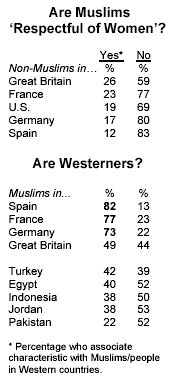 The rare point of consensus in the survey was that both Muslims and Westerners are convinced that relations between the peoples are generally bad. In the West, 70% of Germans and 55% of Americans think so. This is matched by 64% of Turks and 58% of Egyptians who believe this, too. Large majorities of Muslims blame Westerners for the problem. Many Europeans and Americans point their fingers at the Muslims, but many in the West also accept some responsibility for the problem.
The rare point of consensus in the survey was that both Muslims and Westerners are convinced that relations between the peoples are generally bad. In the West, 70% of Germans and 55% of Americans think so. This is matched by 64% of Turks and 58% of Egyptians who believe this, too. Large majorities of Muslims blame Westerners for the problem. Many Europeans and Americans point their fingers at the Muslims, but many in the West also accept some responsibility for the problem.
Each side has a mostly negative image of the other people. Westerners see Muslims as fanatical, violent, and not tolerant. Muslims see Westerners as selfish, immoral, and greedy, as well as violent and fanatical.
Last year’s controversy over cartoons of Muhammad highlights the divide between Muslims and the West. Most people in Jordan, Egypt, Indonesia, and Turkey blame the controversy on Western nations’ disrespect for the Islamic religion. In contrast, majorities of Americans and Western Europeans who have heard of the controversy say Muslims’ intolerance to different points of view is more to blame.
The chasm between Muslims and the West is also seen in judgments about how the other civilization treats women. Western publics, by lopsided margins, do not think of Muslims as respectful of women. But half or more in four of the five Muslim publics surveyed say the same thing about people in the West.
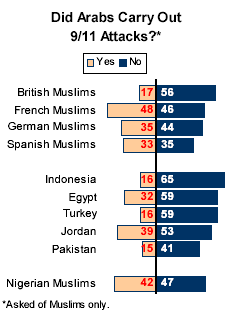 A second conclusion of the poll is that Muslims have an aggrieved view of the West. Many blame United States and Western policies for their lack of prosperity. For example, this is the opinion of 66% of Jordanians and 59% of Egyptians who think that their country should be more prosperous than it is. Westerners most often point to government corruption and Muslim fundamentalism as the cause of the problem.
A second conclusion of the poll is that Muslims have an aggrieved view of the West. Many blame United States and Western policies for their lack of prosperity. For example, this is the opinion of 66% of Jordanians and 59% of Egyptians who think that their country should be more prosperous than it is. Westerners most often point to government corruption and Muslim fundamentalism as the cause of the problem.
A number of measures in these surveys show Muslims feeling more embittered toward the West and its people than vice versa. They attribute more negative qualities to Western people than Westerners do to Muslims. They also rate Christians and Jews less favorably than Europeans and Americans rate Muslims. One of the startling findings of the survey is that most Muslims remain unconvinced that Arabs carried out the September 11th attacks. In Indonesia, 65%, in Jordan 53%, and in Turkey 59% deny that the attacks were carried out by Arab men.
While Muslims feel aggrieved, Westerners are skeptical and wary of Muslim values. For example, Western Europeans and Americans see a conflict between Islam and modernity more often than do Muslims themselves. Westerners also see somewhat more support for al Qaeda in the Muslim world than do Muslims. The current poll finds Europeans are less optimistic about prospects for democracy in Muslim countries than Muslims are. This may reflect our finding that American and Western European are dismayed over the Hamas election victory. Muslims in the Mideast, Asia, and Africa see this as a positive development for the Palestinian people.
In this regard, this year’s poll also finds increasing sympathy for Israel in Western Europe. Europeans do not match American public opinion – where the percentage sympathetic to Israelis is more than three times greater than that sympathetic to Palestinians – but it is moving in that direction.
The good news in this poll is that even after a bad year, there was not a spike in outright hostility toward Muslims among Westerners or vice versa. These negative perceptions are of a more long-standing nature. And, as noted above, this poll shows a decline in support for terrorism in important Muslim countries. However, having said that, sizable minorities in major Muslim countries say suicide bombing can be justified. Even among Europe’s Muslims, one-in-seven feel suicide bombings against civilian targets can be justified.
Osama bin Laden is viewed positively by one-in-three in Pakistan and Indonesia and one-in-four in Egypt and Jordan. The most troublesome numbers are out of Nigeria, where 61% of Muslims in that religiously divided country express confidence in bin Laden. Muslims there are highly critical of Westerners and no fewer than 56% say that most or many of their countrymen support extremist groups like al Qaeda – by far the highest in the poll.
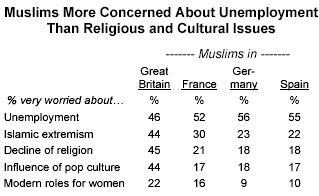 In sharp contrast, the survey found that European Muslims hold more temperate views of the West than do Muslims in the Mideast, Africa, and Asia. Muslims in Great Britain, France, Germany, and Spain have more positive views of Westerners than do Muslims in the Mideast and Asia. They largely hold positive views toward Christians and have less negative views of Jews than do Muslims in the Mideast and Asia. This is especially true in France.
In sharp contrast, the survey found that European Muslims hold more temperate views of the West than do Muslims in the Mideast, Africa, and Asia. Muslims in Great Britain, France, Germany, and Spain have more positive views of Westerners than do Muslims in the Mideast and Asia. They largely hold positive views toward Christians and have less negative views of Jews than do Muslims in the Mideast and Asia. This is especially true in France.
The survey did find that Muslims in Europe worry about their future, but their concern is more economic than religious or cultural. And while there are some signs of tension between Europe’s majority populations and its Muslim minorities, Muslims there do not generally believe that most Europeans are hostile toward people of their faith.
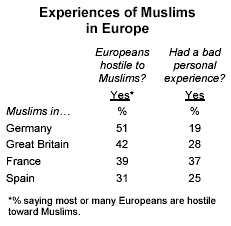 Despite some tension, there is little evidence of a widespread backlash against Muslim immigrants among the general publics in Great Britain, France, Germany, and Spain. Majorities continue to express concerns about rising Islamic identity and extremism, but those worries have not intensified in most of the countries surveyed over the past 12 turbulent months. Still, over a third of Muslims in France and one-in-four in Spain say they have had a bad experience as a result of their religion or ethnicity.
Despite some tension, there is little evidence of a widespread backlash against Muslim immigrants among the general publics in Great Britain, France, Germany, and Spain. Majorities continue to express concerns about rising Islamic identity and extremism, but those worries have not intensified in most of the countries surveyed over the past 12 turbulent months. Still, over a third of Muslims in France and one-in-four in Spain say they have had a bad experience as a result of their religion or ethnicity.
Opinions held by Muslims in Europe – as well as opinions about Muslims among Europe’s majority populations – vary significantly by country. No clear European point of view emerges with regard to the Muslim experience, either among Muslims or in the majority populations, on many issues. British Muslims are the most anxious about their future and most concerned about extremism
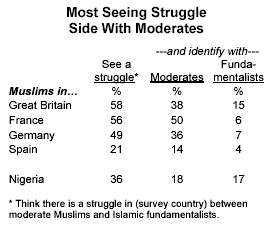 French Muslims are the most integrated and are less likely than others to primarily identify as Muslims and more often see themselves as French first. They are more likely to say they want to adopt European customs than are Muslims in other European countries. German Muslims are the most likely to consider Europeans hostile, although many fewer report a bad personal experience.
French Muslims are the most integrated and are less likely than others to primarily identify as Muslims and more often see themselves as French first. They are more likely to say they want to adopt European customs than are Muslims in other European countries. German Muslims are the most likely to consider Europeans hostile, although many fewer report a bad personal experience.
Generally, European Muslims show signs of favoring a moderate version of Islam. With the exception of Spanish Muslims, they tend to see a struggle being waged between moderates and Islamic fundamentalists. Among those who see an ongoing conflict, substantial majorities in all four countries say they generally side with the moderates.
Most French and British Muslims think women are better off in their countries than in most Muslim countries. About half of German and Spanish Muslims agree, and very few think women actually have it better in most Muslim countries. Moreover, most are not concerned about Muslim women in Europe taking on modern roles in society (although substantial minorities worry about this).
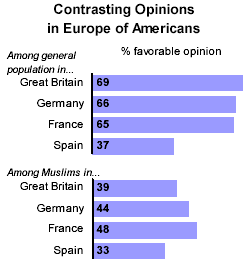 Muslims in Europe are most sharply distinguished from the majority populations on opinions about external issues – America, the war on terrorism, Iran, and the Middle East. European Muslims give the United States lower favorability ratings than do general publics in Europe and, in particular, they give the American people lower ratings. The war on terror is extremely unpopular among minority Muslim populations.
Muslims in Europe are most sharply distinguished from the majority populations on opinions about external issues – America, the war on terrorism, Iran, and the Middle East. European Muslims give the United States lower favorability ratings than do general publics in Europe and, in particular, they give the American people lower ratings. The war on terror is extremely unpopular among minority Muslim populations.
To conclude, it is no secret that the United States has an image problem in the Muslim world. The war in Iraq intensified and broadened discontent with America and its people among Muslims in the Mideast, Africa, and Asia. There is little sign from our surveys that this has meaningfully changed over the past three years. In some predominately Muslim countries there has been improvement, while in others a worsening of attitudes. But the bottom line remains the same. We are poorly regarded by most Muslims and significant numbers of them express at least tacit support for terrorist tactics and enemies of the United States, such as Osama bin Laden.
As events of the past year in Europe have indicated, there is a broad divide between Westerners and Muslims around the world. Our latest surveys have detailed the nature of the complaints from both sides. Misunderstanding, value differences, and economics based resentment have led to suspicion and created a mutually acknowledged divide. The good news is that Muslims in Europe, despite their concerns about their future are nonetheless far more moderate and positive toward the West than are Muslims living in the Mideast, Africa, and Asia. Their attitudes and the general populations in the host countries suggest that exposure may lead to improved understanding, mostly.


